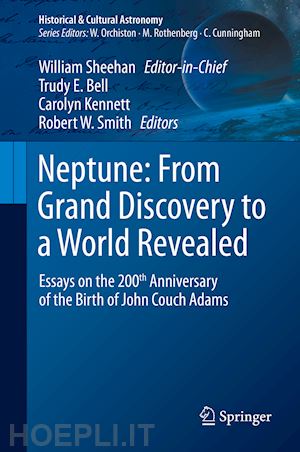William Sheehan is an astronomical historian and author. He is a regular scholar-in-residence at leading observatories, including Yerkes, Lick, Lowell and Mt. Wilson. As both a professional psychiatrist and an astronomer, he has a unique insight into the personalities of the pioneering figures of the history of science. He has published a number of books on the history of solar system studies, especially on the Moon and Mars. Sheehan is a consulting editor of Sky & Telescope, a 2001 fellow of the John Simon Guggenheim Memorial Foundation for his research on the Milky Way, and a recipient of the Gold Medal of the Oriental Astronomical Association. Asteroid no. (16037) is named in his honor.
Robert W. Smith is a Professor at the University of Alberta in the Department of History and Classics. He directed the Science, Technology and Society Program in the Faculty of Arts. Smith served as the Walter Hines Page Fellow at the National Humanities Center in North Carolina in 1993–94. He held the Charles A. Lindbergh Chair in Aerospace History at the U.S. National Air and Space Museum, Smithsonian Institution during the academic year 2006–07. He is a winner of the History of Science Society's Watson Davis Prize and in 2020 he was awarded the Leroy E. Doggett Prize in Historical Astronomy by the American Astronomical Society. Smith has written numerous groundbreaking articles about the discovery of Neptune.
Trudy E. Bell, contributing editor for Sky & Telescope and member of the editorial board for Springer’s Historical & Cultural Astronomy series of books, earned her M.A. in the history of science and American intellectual history from New York University (1978). Her particular research interest is nineteenth-century US astronomy. The author or coauthor of a dozen books, she has been senior writer for the University of California High-Performance AstroComputing Center, and an editor for Scientific American and IEEESpectrum magazines. Her journalism and research awards include the David N. Schramm Award from the American Astronomical Society (2006) and the Herbert C. Pollock Award of the Dudley Observatory (2004 and 2007). Asteroid (323552) is named in her honour.
Carolyn Kennett, FRAS, is a writer, researcher and astronomer who lives in the southwest of England. She is co-editor of the Society for the History of Astronomy Bulletin. She delivers creative engagement opportunities for history, science and astronomy as a director of Mayes Creative Ltd and a director of Cornwall Sea to Stars. She runs her own business Archaeoastronomy Cornwall.











